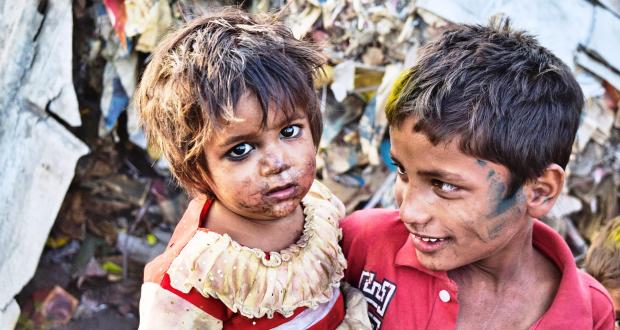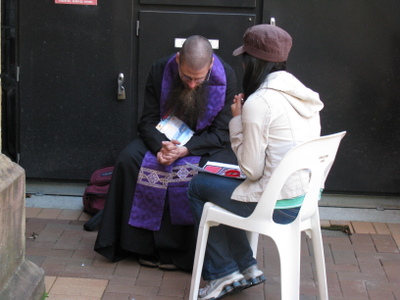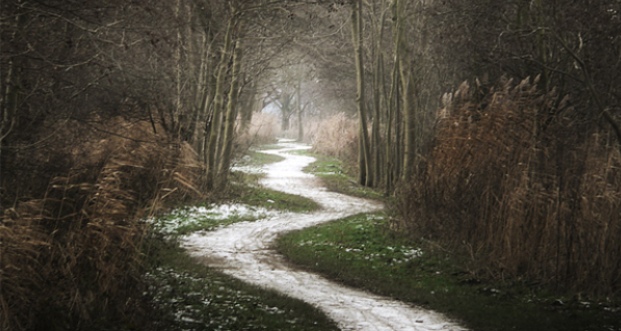The Desire For Wealth – A Source Of Greed, Selfishness And Moral Blindness

Fr Dexter Brereton, CSSp ThM STL
Several months ago, I took a personal decision, that for every “luxury” purchase that I made (e.g. shoes or clothing) I would give the equivalent sum of money to charity. This was my perhaps poor attempt in registering my recognition that in the midst of my good fortune, there stands among us, in this country, many who suffer want and food insecurity. This awareness is heightened by the appearance of what to me is something new, young women standing at major intersections, here in T&T hold up signs asking for help for food for themselves and their children.
My missionary stint in Haiti, gave me a real taste of these contrasting realities. One day, I was visited by a woman called Adrienne, from a dusty little settlement called Gervais, at our presbytery at Pont Sondé. Adrienne brought what looked like a baby in a bundle. While we conducted the interview, the ‘baby’ began to wail and my cook told Adrienne to breast- feed the child so that she would stay quiet. I took one look at the child, and to my horror, I realized that the ‘baby’ was in fact a toddler, a few years old most likely stunted by malnourishment and that the mother had no milk to give her.
The Gospel reading addresses the issue of the greed, complacency and materialism of the wealthy man, who does not realize that he had been living on ‘borrowed’ time. He says to himself “What am I do to? I have not enough room to store my crops.”…”This is what I will do: I will pull down my barns and build bigger ones, and store all my grain and my goods in them, and I will say to my soul: My soul, you have plenty of good things laid by for years to come; take things easy, eat, drink, have a good time.” His wealth, probably the result of hard work fills him with a sense of false security. He thinks he has done everything well, yet at no time during this conversation with himself does he look outside his own life, his own household to think of his responsibility to others. There is a blindness here that Jesus condemns. This kind of complacency, greed and materialism results, more often than not, in a cluttered, clueless, selfish existence.
It is perhaps for this reason that sacred scripture has always had an ambivalent attitude towards material wealth. While riches are often a sign of God’s blessing and wealth can be used to help others, the desire for wealth is also a source of greed, selfishness and moral blindness. This perspective is perhaps what causes Jesus to say that “it is easier for a camel to pass through the eye of a needle than for a rich man to enter the Kingdom of God.” (Matt 19: 24). Again, the rich man in today’s gospel is completely caught up in the ‘process’ of accumulation and in the process he fashions an existence that is both selfish and exclusionary of others.
Catholic Social Teaching makes it quite clear that the right to private property, while valid and necessary, is by no means absolute (Solicitudo Rei Socialis, 42). In this document, Pope John Paul II goes on to say “Private property, in fact, is under a “social mortgage,”which means that it has an intrinsically social function, based upon and justified precisely by the principle of the universal destination of goods.” In other words, the right to private property, while important in itself, is subordinate to the right of all members of the human community to provide themselves with all the basic necessities of life. This wealth obligates the owner to give back to the community so that all may have their basic needs met. This right of all humans to the goods of creation is called in Catholic Social Teaching, the principle of the UNIVERSAL DESTINATION OF GOODS.
The rich man’s inner conversation contains a phrase which should be evocative for all of us: “I will pull down my barns and build bigger ones…” This indicates a life or a system that is focused on accumulation, to the disregard of others. Where is this happening today? As I write, one of our major commercial banks is staging a social media campaign based on the theme of “inclusion” and is a local rendition of “Pride Month” which is popular in North America. I have asked myself, apart from members of the lgbtqia+ community, to whom does this “inclusion” extend? Let us not fool ourselves; banks which make a public profession of inclusiveness towards members of the lgbtqia+ community can be very “exclusive” in other ways. I have heard from friends, stories of their treatment at the hands of local banks which makes me wonder whether they are not operation a system of banking that is ultimately “exclusionary” especially in regards to persons of colour who, may be in search of venture capital. My distinct impression is that there is a feeling among our local population that racism and classism still play a role in our banking sector. The managers and shareholders of our local banks “pull down their barns to build bigger ones” while many people are excluded from their world.
Loving Father, we ask pardon for our materialism, greed and complacency. These cause is to ignore the hungry and the poor. We pull down our barns to build bigger ones, as we become lost in acquiring more wealth, more property. Give us a social conscience so that we may look around us and see the needs of the poor, the hungry and the destitute. Amen.






